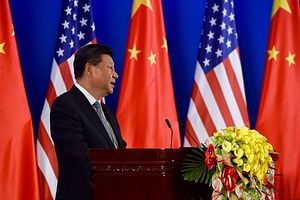The world has repeatedly learned from history that the rise of a great power may not be inherently and necessarily peaceful. With a great number of precedents, many worry that what has happened in history — violent clashes between a rising and existing power — may repeat within the foreseeable future.
Nonetheless, a great power’s grand emergence, including the previous ones in the West, has never been a simple and singular process. Great powers’ growth and emergence inevitably brings certain impacts or maybe challenges (and thus sometimes instabilities) to the existing power structure and system. On the other hand, the relative stability of the power structure, or the peaceful evolution of the whole system, largely depends on the new “drive” brought by rising powers. In other word, without a certain “coherence,” peace and stability, even at the minimum level, can hardly sustain.
According to Immanuel Wallerstein’s The Modern World-System, the “coherence” of a world-system paradoxically stems from a kind of “tension,” through which “conflicting forces” hold the world-system together. To quote Wallerstein:
A world-system is a social system, one that has boundaries, structures, member groups, rules of legitimation, and coherence. Its life is made up of the conflicting forces which hold it together by tension and tear it apart as each group seeks eternally to remold it to its advantage.
Such a “drive/coherence” dynamic may be found in the balance of power in the European treaty system during the 17-19th centuries, the imperialist global trade rules of the previous colonial system controlled by Great Britain, and the responsibility-obligation relations coined by the currently prevailing alliance system under U.S. leadership. The inherent “drives/coherences” defined by the relations or “tensions” of the time helped the leading power(s) to ensure that certain degree of peace and stability in the power structure, thus sustaining the system.
What does this mean for China’s rise? Some pessimists may reckon that China’s rise inevitably bears a kind of “original sin,” as it marks the rise of a heterodoxy that naturally tends to despise certain dominant Western ideologies and values. This is not necessarily true, however, given China’s incremental and substantial involvement in world political and economic affairs, especially since the 1970s. The more basic question remains: Has China’s rise been unique, or might there be some hidden lessons from the rise and fall of previous great powers?
The “drive/coherence” dynamic inspired by Wallerstein’s arguments may help explain China’s unprecedented emergence, especially at a time when the United States still dominates. Let’s take a basic look at some key factors in China’s rise. First, China’s rise since the late 1970s has largely been an economic emergence within the dominant capitalist system originated in the West, and ever since China has been taking an increasingly important role in the global distribution of capital, products, and labor. Second, in modern and contemporary times, China has remained relatively “estranged” from the dominant systems, such as the current alliance system under U.S. leadership, toward which China has been rather wary due to its longstanding non-alignment policy. Third, the also longstanding competition-plus-cooperation relationship between China and the United States indicates that the current alliance system does not directly explain (much less ensure) the rapid and so far relatively peaceful rise of China.
Now, as China strive to further its rise, myriad issues, disputes, and conflicts in the Asia-Pacific security arena seem to prove that a de facto containment policy against China has been an inevitable or even indispensable option for Washington. The real challenge for Beijing is to find out how to evade such hegemonic control. This of course brings us back to the original question: What ensures and facilitates the ultimate rise of a great power and the stability of a certain system?
A new type of “code of conduct” for international relations, what we might call a “rule-based coherence,” is exactly what may help to further and ultimately ensure China’s peaceful rise, regardless of the containment from the United States and its allies. China should extensively seek international consensus, acknowledge common understandings, reach common rules, and of course provide more international public goods, which are all based on not only shared interests but also shared values. This can be the true spirit of a community of common destiny. This world-system will be different from the often asymmetric relations defined by the alliance system and the rules of the largely exclusive small circles anchored by the United States, which often sways between hegemonic and isolationist policies.
In fact, the current situation may suggest that Washington could be opening a door for Beijing. The United States not only boycotted China’s creation of the Asian Infrastructure Investment Bank but also withdrew from the Trans-Pacific Partnership and the Paris Agreement. Does the United States still possess the true spirit, courage, or even the willingness to be a world leader at a time when it seems to be either boycotting new rule-making processes or retreating from the rules in which it does have a crucial role?
Interestingly, in the recently concluded Shangri-La Dialogue, the United States again accused China of “undermining the rules-based order,” but China’s response was clear and firm. China’s representative, taking the Declaration on the Conduct of Parties in the South China Sea and the recent framework of the Code of Conduct in the South China Sea as an example, indicated a core difference between a parochial U.S.-anchored rules-based order and a truly international rules-based order that meets interests of all parties.
In a long-term perspective, the message to Beijing should be like this: If it is the “rules” that today cause friction between China and the United States, in the future the “rules” — or more specifically the “rule-based coherence” above — may also help to mitigate, and possibly further facilitate China’s peaceful and ultimate emergence.

































